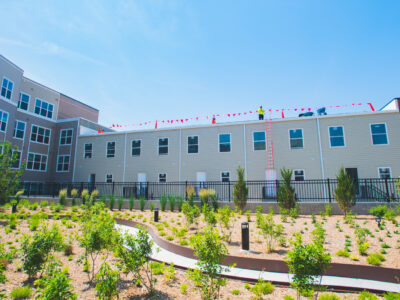Garden & Health’s location in Washington, D.C., has opened a marvel of opportunity. We’ve connected with local businesses doing their part to curb carbon emissions. We’ve covered everything from the DMV’s greenest and rising breweries to some of the federal government’s biggest policy updates. But there hasn’t been a D.C.-based startup like Cambium before.
The company is tackling wood waste with a new strategy: making it into high-value wood products. It takes dying, decaying, diseased, and natural disaster-affected wood and transforms it into Carbon Smart Wood, a wood that is heat-processed and upcycled into new products.
Photo Courtesy Cambium Carbon
Cambium Co-founder Ben Christensen said the inspiration for Cambium came to him when he lived in rural New Mexico. He learned woodworking as a child and studied science to understand climate action better. The experiences helped him realize he wanted to fight climate change using his passion for wood.
“I spent considerable time learning the extent of the challenges posed by wood waste mismanagement,” Christensen said on the company website.
He founded Cambium with his best friend Theo Hooker and former Yale classmate Marisa Repka. They wanted to create more sustainable wood that had a lasting impact.
Carbon Smart Wood is made from salvaged wood from local sources.
“We rescue fallen timber that would otherwise end up in landfills and utilize a thermal modification process that involves natural heat and steam to remove moisture from wood cells,” Christensen explained to Sustainable Brands. “The result is wood that is lighter in weight and easier to handle/install. Thermally modified wood is also less susceptible to cupping and warping changes in humidity and lowers the risk of fungal attack because the wood no longer contains sufficient nutrients.”
Cambium’s product’s most impactful trait is its carbon sequestration properties. According to a company blog post, the wood acts as a “carbon reservoir,” locking away carbon dioxide (CO2) emissions that would otherwise enter the atmosphere. The repurposed wood also reduces deforestation and new wood for products like furniture and fencing, eliminating emissions from logging.
The company says Carbon Smart Wood adheres to the same principles as renewable energy deployment: using more of a sustainable alternative reduces the need for traditional sources. The upcycled wood can be used for all conventional lumber use. Cambium says the Carbon Smart Wood emits seven times less carbon than wood-plastic composites. T
The wood’s supply chain is tracked on the Traece system, invented by Cambium. The system shows all environmental aspects of the wood’s journey from sourcing to manufacturing
. This effort provides a carbon footprint report Cambium can use to make more eco-conscious business decisions. According to the company, Traece has around 245 users as of June.
Photo Courtesy Cambium Carbon
Major U.S. cities are contracting Cambium for wood removal needs. The company is working with the Fairmount Park Organic Recycling Center to create the Philadelphia Reforestation Hub. This revolutionary partnership is the first public-private partnership for wood waste capture and professional training.
Cambium says it diverted 323 logs from landfills as of August 2023. Workers are trained on how to use Traece, while the sawmill workers are trained by PowerCorps PHL, an organization that helps 18- to 30-year-old workers find work in cleantech and green jobs. Cambium is also helping replant Philadelphia’s trees in low-canopy areas thanks to a partnership with TreePhilly.
“Philadelphia’s Reforestation Hub partnership innovates urban sustainability by salvaging wood for lumber, using Cambium Carbon’s Traece software, and allocating 15% of profits for community-focused greening,” Jane Smith, Sustainable Cities advocate, said on the Cambium website. “It’s a model for cities aspiring to create a circular economy and a greener future.”
Cambium donates 15% of all Carbon Smart Wood sales to reforestation projects, urban forest stewardship, and other community-benefitting endeavors.
The firm says it has planted 5,821 trees and has had projects across cities like New York, Philadelphia, Pittsburgh, San Francisco, the Twin Cities, and Portland.
According to the company, around 3.1 million board feet of Carbon Smart Wood have been created, reducing the emissions equivalent to almost 8,000 miles driven or 360 gallons of gas. One board of wood can store up to 5.23 pounds of CO2 emissions.
Cambium’s work has been highlighted by international environmental watchdogs like the World Economic Forum (WEF). The WEF commended the company for its work in salvaging wood from burning, mulching, and landfill waste. The organization also said that carbon sequestration and a focus on reforestation were critical in fighting climate change. In March, Fast Company named Cambium one of its 2024 Most Innovative Companies.
The business wants a considerable impact, hoping to produce 1.7 billion boards of smart wood and 5.7 million trees planted by 2050. More funding and purchasing upcycled wood products will help them reach that goal. Patagonia, Guinness, National Geographic, and Room & Board have used Cambium’s wood, further cementing the firm’s rising popularity.
Check out the episode of the Consensus in Conversation podcast featuring Ben Christensen of Cambium.





